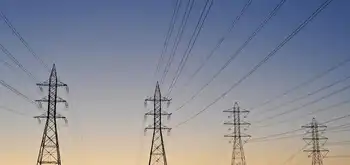NYISO seeks changes to energy bidding
By Atlanta Business Chronicle
Protective Relay Training - Basic
Our customized live online or in‑person group training can be delivered to your staff at your location.

- Live Online
- 12 hours Instructor-led
- Group Training Available
New York State Independent System Operator filed the 51-page document with the Federal Energy Regulatory Commission, which asks if it can cap the plantsÂ’ bids in the future. The three power generators are outside New York City.
The “public” version of the filing, which is posted on NYISO’s Web site, does not name the power plants or how much their alleged inflated bids cost customers.
All commercial and residental customers that buy energy from NYISO or pay for energy based on NYISO prices would be affected by the inflated bids.
“Eventually, it would trickle down to them,” NYISO spokesman Gregor Wynnyczuk said.
A power provider could be the only bidder if a generator it operates is at a strategic location.
An independent study released earlier this year alleges that New YorkÂ’s consumers pay $2 billion a year more than they should for electricity because the stateÂ’s auction system is flawed.
The study by Robert McCullough of McCullough Research in Oregon was made public in March by Assemblyman Richard Brodsky, D-Westchester. McCullough is the energy expert who helped uncover Enron Corp.Â’s energy market manipulation.
New York’s auction system works this way: Power producers bid hourly on the price they want to be paid for their electricity. NYISO stops accepting bids when the power needs are met. All the winning bidders are paid the last — and highest — wholesale bid price, known as the “market-clearing price.”
Brodsky introduced a bill during the last legislative session that would require the state Public Service Commission to tighten regulation on utilities and change the way wholesale electricity is sold in New York. Brodsky wants bidders to pay the price they bid rather than the highest bid.
“The public is being swindled by a bizarre and irrational system,” Brodsky said in a July phone interview. He described the current auction system as “anti-competitive” and “anti-free market,” and one that encourages bid manipulation.
States with similar market-rate auctions recognize defects in the program and are changing their bidding rules, Brodsky said.
Both NYISO and Albany-based Independent Power Producers of New York, the trade group that represents power generators, defend the current bidding system. They say it actually drives down the price of electricity because higher bidders take the chance of being shut out.
NYISO said that the behavior identified in its document filed with FERC involved times when one of the three operators was chosen because “it was the only available solution to a particular reliability need.”
The nonprofit focused on instances when the three generators were able to submit bids above their marginal cost “without fear that competitors would undercut their bids,” NYISO wrote in response to questions from The Business Review.
NYISO wants to develop caps when the bids involve only one supplier.
FERC will accept public comments about NYISOÂ’s proposed measures through September 25, FERC spokeswoman Barbara Connors said.
The commission will determine any action after that time.
Connors said she didnÂ’t know the names of the utilities, and wasnÂ’t sure when, or if, their identities would become public. FERC is the regulating agency for wholesale energy prices.











